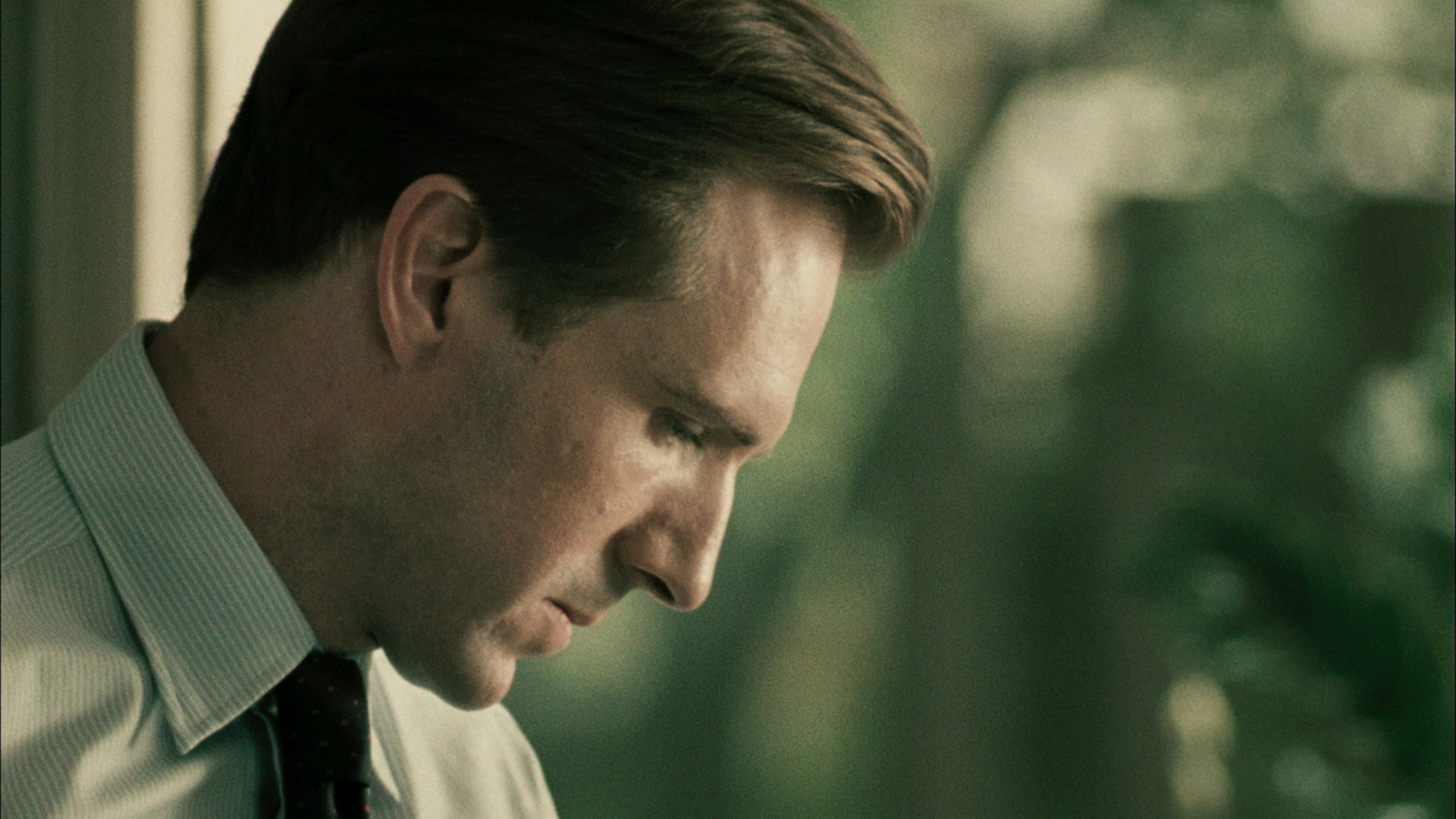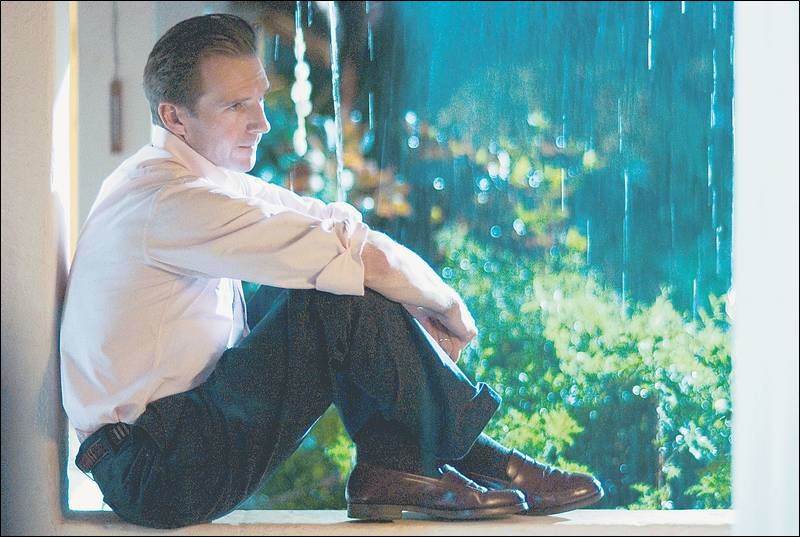by Lynn Lee

Our first glimpse of Justin Quayle is in darkened silhouette. The second is a medium-long shot of him tending his garden. The camera only comes in for a closeup as he’s hit with the worst news of his life—and even then, we see the impact register only gradually. That slow burn reveal, that deceptive quietness masking layers of anguish, sums up not only The Constant Gardener as a whole but Ralph Fiennes as Justin. It's one of the finest performances of 2005 and among the best of the esteemed actor's career...
Today, of course, The Constant Gardener is remembered mainly for Rachel Weisz’s Oscar-winning turn as Justin’s firebrand wife, Tessa. Her death sets the narrative, and Justin, into motion. (The movie was also nominated for adapted screenplay, editing, and score, and as Nathaniel’s discussed, was probably just outside the best picture field.) Weisz is excellent, as I’m sure the upcoming Smackdown will discuss in great detail, as is the film, which I responded to much more on a recent rewatch than I did at the time of its original release. Maybe knowing the twists and turns in advance, I was better able to appreciate the craft with which the central mystery is structured. Maybe I’m less disposed now to compare it to Meirelles’ previous film, City of God, which had struck me like a thunderbolt just a couple of years earlier. Or maybe the underlying story of murderous malfeasance by a big-pharma company hellbent on getting its miracle drug to market has especially uncomfortable resonance in the era of COVID-19.

But even in 2005, I was impressed by Fiennes and what he was able to do with a protagonist who could have come across as dull or inexpressive but in his hands becomes an achingly poignant embodiment of grief spurred to action. His acting isn’t in the least showy (and we know Fiennes can do showy), but rather an extraordinary exercise in nuance and control that exemplifies the adage “less is more.” The result is a remarkably affecting portrait of a soft-spoken, make-no-waves diplomat who evolves into a dogged investigator and unlikely bearer – for at least a little while – of his wife’s crusading torch.
Take that first, critical scene when Justin learns of Tessa’s murder from his boss, Sandy (Danny Huston). Fiennes’ face remains completely still, and other than an almost imperceptible dimming of his expression and a glimmer of what might be a tear in his eye, shows no sign of shock or consternation. Even when he’s told Tessa was probably cheating on him (a suspicion we’ll later learn he was already nursing) and that her supposed lover may have killed her, he doesn’t flinch. He merely looks down and murmurs, “That’s good of you to tell me, Sandy. It can’t have been easy.” Later, when faced with Tessa’s badly burned-up corpse, he closes his eyes for just a moment, but apart from a slight huskiness in his voice as he identifies her, retains his composure. Fiennes’ restraint somehow makes Justin’s pain sharper and more intensely apparent than a more openly emotional display would have done.
Even as Justin methodically proceeds to unravel the web of corruption and cold-blooded betrayals that led to Tessa’s death, he hardly ever raises his voice or forgets his manners even in the tensest moments or at the most horrifying discoveries. Yet Fiennes effectively conveys the unexpected resolve and tenacity that lies beneath Justin’s nonconfrontational exterior – perhaps channeling Tessa’s spirit, perhaps drawing on something latent in his own nature. He’s a gardener, after all; he digs.

Interwoven with his increasingly dangerous digging are flashbacks of his life with Tessa that reveal intriguing facets of their relationship and his own indirect complicity in her fate. Both actors do a marvelous job portraying both the chemistry and the inevitable friction between their characters’ polar-opposite temperaments. However, perhaps because the story is told from Justin’s perspective, for most of the movie it’s Fiennes who pulls on our emotions as he veers silently between love, doubt, frustration, and back again to love with only the subtlest variations in his demeanor. If Tessa is the soul of The Constant Gardener, then Justin is its broken but still-beating heart. His breakdown, when it finally happens, feels not so much overdue as hard-earned—as does the zen-like, fatalistic peace that follows the completion of his quest for the truth.
Sadly though unsurprisingly, Fiennes attracted little awards attention in a year filled with much flashier performances and high-profile movies about historical figures. He did get a BAFTA nod, losing to Philip Seymour Hoffman for Capote. Notably, apart from Fiennes, the BAFTA lineup for best actor that year was identical to Oscar’s, with Terrence Howard taking the fifth Oscar slot for Hustle & Flow. Fiennes was probably never in contention for that spot; it doesn’t help that male leads who are quiet, gentle, or more reactive than proactive are generally a tough sell for Oscar. Still, in retrospect the Academy really missed out on a chance to recognize some of the strongest work to date by one of our finest living actors. I thought that in 2005, and I still think that today.

More on 2005, our 'year of the month'
- The New Classics: The New World
- When Tilda went Mainstream
- Taraji P Henson in Hustle & Flow
- Colleen Atwood vs Sandy Powell
- Joan Allen in The Upside of Anger
- Gong Li in Memoirs of a Geisha
- The Year of Joseph Gordon-Levitt
- Mercedes Morán in The Holy Girl
- Vintage '05 Pop Culture Highlights
- Rodrigo Prieto's cameo in Brokeback Mountain
- The New Classics: Capote